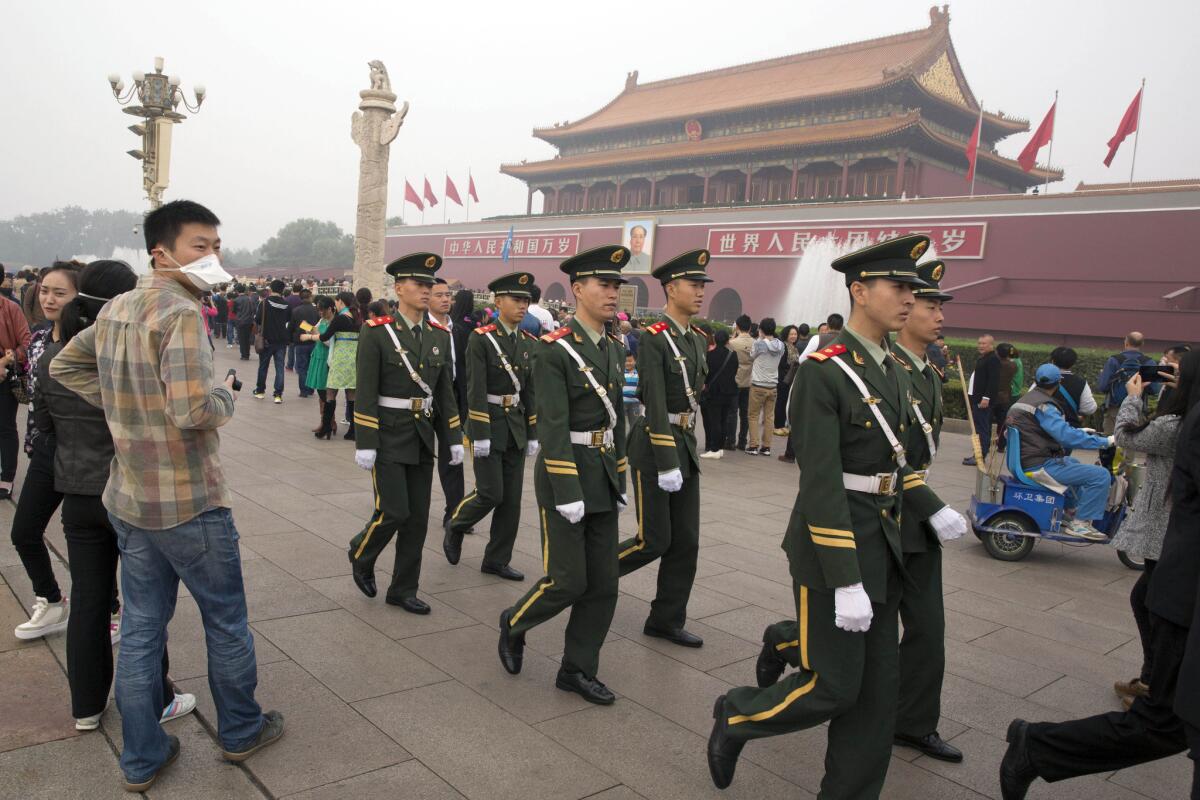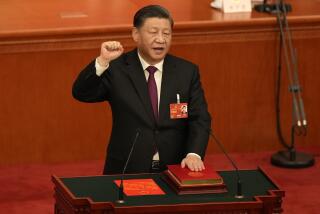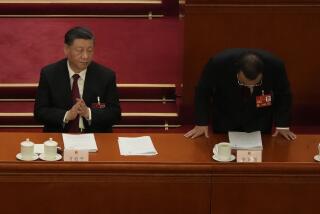China’s ruling Communists take up ‘rule of law’ - their way

- Share via
Reporting from Beijing — China’s Communist Party leaders will kick off a high-level four-day meeting Monday centered on the theme of rule of law. But while there may be some small tweaks to the legal system to reduce abuses at the local level, experts say introducing Western-style rule of law that would subject the one-party system to independent checks by the judiciary is out of the question.
Anti-corruption efforts and the economy are also expected to be high on the agenda of the Fourth Plenum of the 18th Party Congress, which will gather together the several hundred members of the party’s Central Committee. Among the big questions hanging over the gathering is whether the party will announce results of its graft investigation of former domestic security czar Zhou Yongkang, the most powerful figure to be swept up in President Xi Jinping’s anti-corruption campaign.
Though China is currently facing a number of serious challenges that would seem to relate to the rule of law – including democracy protests in Hong Kong and flaring violence in the restive far western region of Xinjiang – Chinese leaders prefer plenums to showcase progress, not problems.
Coming about two years after Xi took the helm of the party for what is expected to be a 10-year reign, the gathering is an opportunity for him to highlight his achievements and underline how firmly he has consolidated power.
Since November 2012, Xi has shored up his control of the military, implemented a far-reaching anti-graft campaign that has won widespread public support and sidelined rivals, and made numerous foreign trips in a bid to boost economic and political alliances and raise China’s international profile.
“On all fronts, he’s in power,” said Zhang Lifan, a noted Communist Party historian based in Beijing. “From what I’ve observed from his recent public appearances, he looks much more relaxed. ... I think he’s very confident with what he’s achieved.”
Still, the country is rife with conflicts over land seizures, labor disputes, pollution and food safety problems – all of which point to the need to improve both legislation and enforcement of the law. Hence the plenum’s emphasis on rule of law, part and parcel of Xi’s good-governance, strong-party campaign.
“In the past we’ve had a situation where local officials basically ignore the law and do whatever they want,” said Steve Tsang, professor of contemporary Chinese studies at the University of Nottingham in Britain. “A senior local official would say: ‘I am the law, what I say is the law.’”
“At the grassroots level, a lot of people are not happy,” added Zhang. “So party leaders are willing to make certain policy changes so that the bureaucratic system becomes more efficient and will also address some grievances that people have, thus lowering the costs of maintaining social stability.”
Exactly what mechanisms the plenum will put forth to curb such abuses by local officials is uncertain, experts say, though there clearly will be more focus on central party control of courts.
Though the main topic of the plenum – fazhi – is often translated as rule of law, Tsang called this “deliberately misleading,” and said “rule by law” would be a more apt reflection of the intent.
“This is not to say it’s not important; in fact they are using the law far more and it is not insignificant. But it’s not ‘rule of law’ as we understand it -- it’s the law being used as a more effective instrument by the party as an instrument for control and as an instrument for improving governance,” Tsang said. “From the perspective of the party in China, the two things are not mutually exclusive; they are actually complementary.”
Most ordinary people who interact with the justice system on run-of-the-mill criminal matters are likely to see some improvements, Tsang predicted. But noting that South Africa’s apartheid-era government was one where “rule by law” prevailed and human rights abuses were institutionalized, he added: “When it comes to matters dealing with dissidents or political issues, then the party’s direction and control will get stronger, not weaker. … From that perspective, things are going to get worse.”
Teng Biao, a noted Chinese lawyer who is now a visiting scholar at Harvard University, said that since March 2013 more than 300 human rights activists and lawyers have been arrested or otherwise constrained by Chinese authorities.
“This really shows that after Xi Jinping took office, he has stepped up the crackdown on civil society and those who promote civil society,” said Teng. “His crackdown on [the] human rights movement has been much stronger [than under previous leader Hu Jintao] and it will continue.”
At the previous plenum, in November, Chinese leaders unveiled several major policy shifts, including abolishing the country’s notorious labor camp system and modifying the nation’s longstanding one-child policy to allow more couples to have multiple children.
Expectations for this year’s gathering are more modest. But one of the interesting aspects of the plenum that will bear watching is how Xi and others use rhetoric.
“Both domestically and foreign policy wise, I think the current administration is very satisfied with its work so far,” said Jin Zhong, a Hong Kong-based political analyst. “But based on the habits of the Mao era, they’ll come out with [humble] slogans saying they need not be overly proud of what we’ve done, and not be satisfied with our achievements so quickly.”
Increasingly, Xi has been moving away from party jargon and instead looking to cast today’s Communist rulers as faithful inheritors of Confucian thought and other Chinese cultural traditions.
Xi has visited Confucius’ hometown, addressed a Confucius conference, urged that schools keep traditional Chinese poetry in textbooks and repeatedly cited the teaching of the ancient sage as a touchstone for today’s party initiatives ranging from the anti-corruption drive to the role of art and culture in society.
China’s “excellent traditional culture,” Xi said last week, is the “spiritual lifeline” of the Chinese nation and the root of the “Socialist core value system.” That core value system, Xi has said, encompasses prosperity, democracy, civility, harmony, freedom, equality, justice, rule of law, patriotism, dedication, integrity and friendship. Banners and signs with those key words have been popping up across Beijing in recent months.
“The whole purpose is about securing Communist party rule in China, because when they talk about ... Marxism and socialism, no one buys into that anymore,” said Zhang, the historian. “He’s trying to borrow old Chinese traditions and ideologies to reestablish some belief in China, and maintain their authority.”
“He’s trying to use Confucian theories on the outside to show the public, ‘I’m a kind, benevolent ruler and we will have humane ways of addressing people’s concerns,’” added Zhang. “But internally it’s still a one-party, authoritarian government. It’s Marxism mixed with Confucius. It’s a way to make the one-party system look better.”
Follow @JulieMakLAT for news from China
More to Read
Sign up for Essential California
The most important California stories and recommendations in your inbox every morning.
You may occasionally receive promotional content from the Los Angeles Times.











